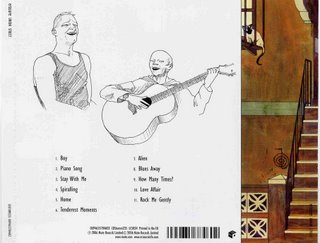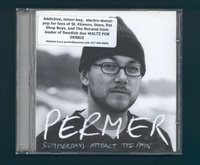Polly Brown, "So Much In Love" (1973)Gather round, children. Let me tell you about my own singing career.
Yes, my singing career. It's not just a case of "those who can't, write," you know. Granted, said career was very short, very abbreviated. Over before it began, really. But those who shone briefest, shone brightest.
It started with my being in the school choir during the equivalent of fifth and sixth grades.
Of course I was in the choir; have you met me? It was either that or being an altar boy, and I chose the path of least incense. The memory's not what it used to be, so I now don't recall that much about those early singing days. I know we did enter a nation-wide interschool competition on at least one occasion. For the performance, I had to have blush liberally applied to my cheeks, which I'll have you know I fought valiantly against. Yes I did. And I had to wear a red bowtie. I felt pretty, and witty, and gay. I think we sang several numbers, one of which was "Sunrise, Sunset" from
Fiddler On The Roof. I'm so grateful for that. Nowadays, whenever I see my friend Cristina Garcia Perez Maria Conchita Sanchez, as I do only every few years, she always dramatically moans about how I get more handsome each time (untrue), how I've grown since we first met each other sixteen years ago (true, in the sideways sense). And then, together, we duet on a few choice verses: "Is this the little boy I carried? Is this the little girl at play? I don't remember getting older, when did they?" I wouldn't be able to carry on without the benefit of my choir training.
Realizing that the red bowtie only brought out the color of my eyes, I retired from my showbiz career after primary school. But my adoring public forced me back into the limelight, albeit by a circuituous route. I became a boy scout. Yes: I was a boy scout. I keep unfolding like a flower, don't I?
You wouldn't think that Baden Powell's teachings allowed for much singing, but you would be wrong. Each year, during the troop's annual camp -- that's "camp" as in "roughing it in tents" -- there would be a Talentime competition. Are you excited yet? Patrol was pitted against patrol in two segments: there was first a music quiz, and then an actual singing competition.
Needless to say, I always ruled
so hard on the quiz. As for the singing portion, my patrol didn't just do well, but, children, we revolutionized it in 1983. Before we came along, group after group would get up on the makeshift stage, and mumble embarrassedly through some folk ditty. Well, we were tired of this decidedly amateurish approach. We made a bold decision.
We were going to incorporate hand gestures into our performance. Oh my god, etc.. We didn't even care if it resulted in us being beaten to death the next day for high faggotry. We were in it to win it.
We had a stunning rendition of "Bright Eyes (Theme From Watership Down)" lined up. All we needed was some pointy poses. We weren't going to be literal; we only wanted to evoke just the
slightest hint of animated bunnies. Under the glare of a lonely torchlight, we sang our little hearts out, pondering how the light that burned so brightly could suddenly burn so pale. And we raised our hands in unison, up to the heavens. Then we lowered them. Then raised them again. It was
tres professional and
uber moving, if I may say so myself.
Of course we won. More importantly, we raised the bar. The game, it was broughtened. In subsequent years, the other patrols could not help but grudgingly buy in if they wanted to hang with us. They too were going to throw some shapes. But we were ready. Oh, were we ready. The next year, we started planning early, spending months musing over song choice. Uneasy the head that wears the tacky crown. This must have been 1984, so I was obsessed with Culture Club and
Colour By Numbers. Perhaps, I thought, we could sing "Black Money," and do an interpretative dance to portray the filthiness of capitalism? But it was too difficult; as hard as I wailed while the other members of the patrol sang the main melody line, I was no Helen Terry. Defeated, we settled for "Changing Every Day," a dubious choice at best, even though we did it well.
Our closest competitor, however, were gaining on us. In a bold masterstroke of evil genius, they sang "So Much In Love." This is a doo-wop, almost acapella number, and thus exactly the right thing to perform. Before that fateful evening, I had never heard it before, and didn't know then that it was originally done by
The Tymes, and topped the US charts in 1963. My guess, however, is that our competitors heard the song as a cover version by
Art Garfunkel. For some inexplicable reason, Poodlehead's cassette was a hot favorite in the scout troop in those years, and of course where we got "Bright Eyes" from the year before. Furthermore, "So Much In Love" allowed our rivals some supremely naff choreography that crossed the line into sheer genius. As they sang the lyric about being in love, they turned their backs to the audience and wrapped their arms around themselves, as if locked in lovers' embraces. Peter Paul and Mary, this was -- it still hurts to admit this -- even gayer than anything I could dream up. I had been hoist with my own petard at every turn! CURSES!
The results were close; our rivals ended up edging us slightly on the singing portion of the evening. (Frankly, I also blame the biased Russian judge.) Thankfully, I kicked their asses in the quiz segment, and my patrol did end up retaining our overall champion status on Talentime night. Bittersweet, my dears, bittersweet.
Years later, I heard "So Much In Love" again, this time
as covered by Polly Brown in a wonderful girlgroup style. It's still brilliant, even if it reminds me of my own failure. And just last week, I ran into a member of that rival patrol, someone who was in fact the mastermind of their performance, the Nomi to my Cristal. In a record store, no less. We could have conquered the world together. Instead, we exchanged pleasantries, circled each other warily, and retreated to plan our next face off. Someday I will have my revenge.






